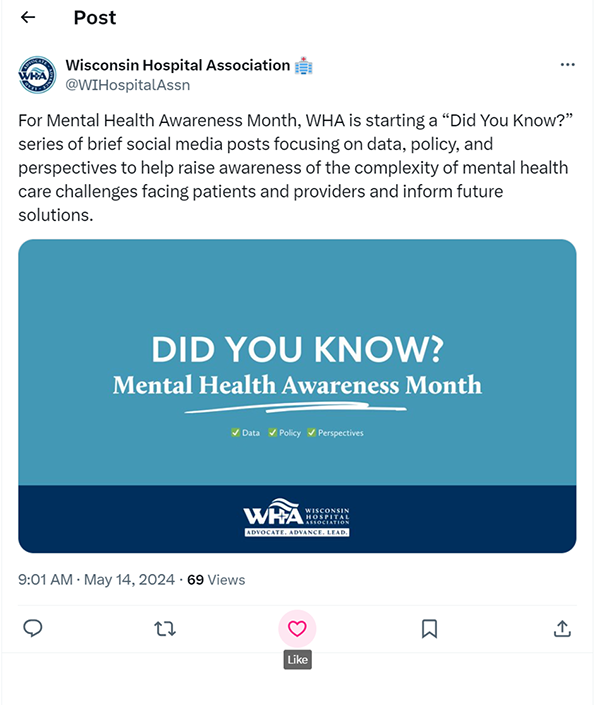Vol. 68, Issue 20
View more issues of The Valued Voice
Sign Up for WHA's Newsletter
Click here to view past issues
IN THIS ISSUE
- WHA Sets Record Straight on 2024 RAND Study
- President’s Column: Wisconsin Hospitals Lead in Providing Patients with Pricing Information
- Encourage Wisconsin Graduates to Pursue a Career in Health Care
- Panel Discussion Tops Meeting of Governor’s Health Care Workforce Task Force
- ICYMI: From STAT News: Unnecessary insurance claim denials compromise patient care and provider bottom lines
- 2024 Wisconsin Rural Health Conference Rounds Out with Compelling Agenda Topics on Last Day
- WHA Highlights Data and Complexity in Mental Health Awareness Month Social Media Messaging
- Second Annual Hospital Board of Directors Day of Learning Held in Madison on May 8
- Grassroots Spotlight: AdventHealth Durand joined by Rep. Van Orden and Sen. Baldwin Staff to Celebrate New Ambulance Bay Ribbon Cutting
EDUCATION EVENTS
Apr. 9, 2025
2025 Advocacy DayApr. 22, 2025
Nursing ServicesMay. 14, 2025
2025 WHA Workforce ForumClick here to view quality event calendar
View more issues of The Valued Voice
Sign Up for WHA's Newsletter
Thursday, May 16, 2024
WHA Highlights Data and Complexity in Mental Health Awareness Month Social Media Messaging
For Mental Health Awareness Month, WHA created a “Did You Know?” series of brief social media posts on X (formerly Twitter) focusing on data, policy, and perspectives to help raise awareness of the complexity of mental health care challenges facing patients and providers and inform future solutions.
To follow WHA’s Mental Health Awareness Month messaging on X, go to https://twitter.com/wihospitalassn.
Initial “Did You Know?” posts focused on resources and data from the WHA Information Center that can help inform and support statewide, regional, and local mental health planning efforts.

To follow WHA’s Mental Health Awareness Month messaging on X, go to https://twitter.com/wihospitalassn.
Initial “Did You Know?” posts focused on resources and data from the WHA Information Center that can help inform and support statewide, regional, and local mental health planning efforts.
- The WHA Information Center has 10 free, public dashboards of inpatient and emergency department mental health trends in Wisconsin available to provide informative, actionable info for mental health needs and planning.
- In 2023, Wisconsin hospitals had 81,150 emergency department visits for mental health or substance use disorder, a 6.7% increase from 76,034 in 2022.
- Although hospital emergency department visits increased in 2023, inpatient admissions at the State of Wisconsin’s Winnebago Mental Health Institute decreased 12.5% from 3,472 in 2022 to 3,037 in 2023.
- In comparison to the 3,037 admits at Winnebago Mental Health Institute in 2023, Wisconsin’s private sector hospitals had 43,481 inpatient admissions for mental health or substance use disorder, accounting for 87.2% of all such admissions in Wisconsin.
- Medicaid accounted for 46% of the 43,481 inpatient admissions for mental health or substance use disorder in Wisconsin private sector hospitals in 2023.
- Wisconsin’s Medicaid program pays psychiatric hospitals 15% less than the hospital’s costs as calculated by CMS. As a result, a psychiatric hospital incurs a loss every time the hospital admits a Medicaid patient.
- Medicare excludes inpatient psych in small rural hospitals (CAHs) from the payment system created to sustain rural hospitals. Result: Loss of rural inpatient psych due to much higher losses than physical health services.
- In 1970, the number of county/state operated psychiatric beds in Wisconsin was 13,234 beds. In 2023, Wisconsin had fewer than 250 county/state operated inpatient psychiatric beds.
- Between 2019 and 2023, county provided public mental health services has fallen from 74,897 individuals served to 57,832 individuals served.
- Since Wisconsin counties were authorized in 1995 to only provide mental health services based on funding availability, gov’t has shifted those public needs to hospital ERs who are prohibited from turning away patients based on ability to pay.

